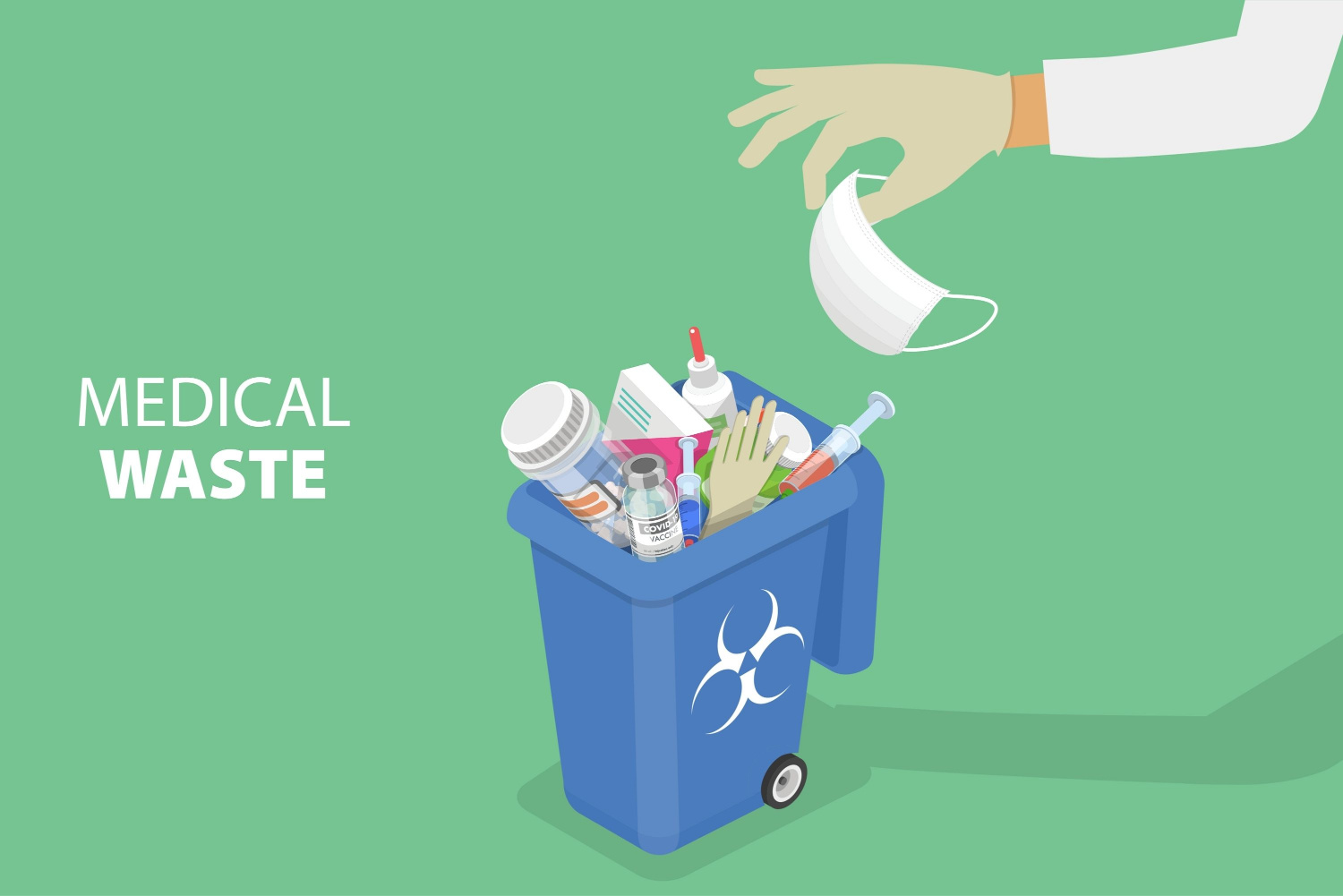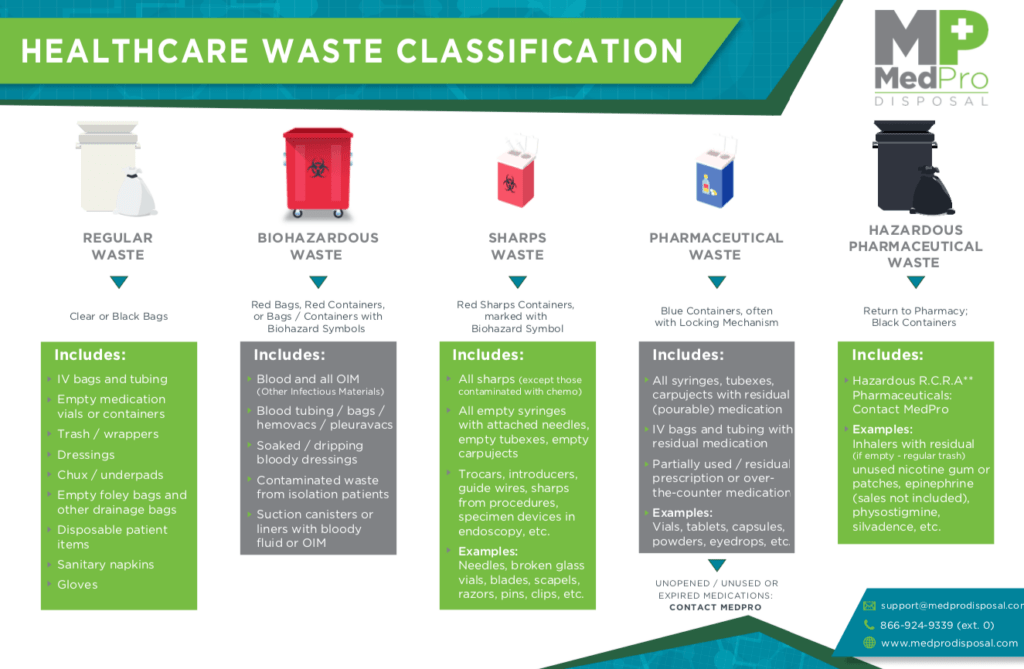Compliant and Reliable Medical Waste Removal Service: Partnering for a Cleanser Future
Wiki Article
Appropriate Disposal Strategies for Medical Waste
Appropriate disposal strategies for clinical waste are of utmost significance in making certain the safety of both health care employees and the public. The appropriate handling and disposal of clinical waste is essential to prevent the spread of contagious illness and the contamination of the atmosphere. This includes the secure disposal of sharps, contagious waste, and pharmaceutical waste. Sticking to rigorous standards set by regulative bodies is vital to maintain compliance with legal guidelines and shield public health and wellness. This intro will check out the significance of proper clinical waste disposal, provide guidelines for taking care of various kinds of waste, and highlight the requirement for health care centers to adopt ideal methods. By following these guidelines, doctor can add to a safer and much healthier atmosphere for all.Significance of Appropriate Clinical Garbage Disposal
Proper clinical waste disposal is of utmost relevance in order to avoid the spread of infections and shield public health. Clinical waste refers to any kind of waste generated throughout clinical procedures or from the health care sector.One of the primary factors for proper clinical waste disposal is to avoid the spread of infections. By securely disposing of medical waste, the opportunities of exposure to these virus are dramatically decreased, ensuring the safety of medical care workers, people, and the community at big.
Furthermore, appropriate clinical garbage disposal is essential for protecting public health. Clinical waste that is not appropriately managed can infect soil, water bodies, and even food resources. This can cause the transmission of conditions to animals and people, posing a substantial public health danger (WasteX Medical Waste Disposal). By following correct disposal methods, such as containment, partition, and treatment, we can minimize the potential threats related to clinical waste and secure the health of the neighborhood.
Handling and Disposing of Sharps
When it involves the handling and disposal of sharps, adherence to proper procedures is vital for making sure the safety and security of healthcare workers and stopping the threat of injury or infection. Sharps consist of needles, syringes, lancets, and other products with the prospective to penetrate or reduce the skin. As a result of their potential to transmit bloodborne pathogens, such as HIV and liver disease B and C, it is important to take care of and get rid of of sharps properly.
Disposal of sharps containers need to comply with neighborhood guidelines and standards. It is best to make use of accredited medical waste disposal solutions that specialize in the proper handling and disposal of sharps to make sure compliance with regulations and lessen risks to health care employees and the atmosphere.
Standards for Contagious Garbage Disposal
Contagious waste, likewise understood as biohazardous or biomedical waste, refers to materials that are possibly contaminated with infectious agents or other harmful materials. Correct disposal of transmittable waste is crucial to guarantee the security and wellness of health care workers, individuals, and the general public.The guidelines for transmittable waste disposal vary depending on the country and neighborhood guidelines, but there are some typical practices that health care centers should comply with. All infectious waste needs to be segregated from other kinds of waste at the factor of generation. Infectious waste ought to be transported and disposed of by accredited waste monitoring companies that specialize in managing biomedical waste.
It is important for health care facilities to have thorough training programs in position to inform personnel on the correct treatments for infectious garbage disposal. This includes training on waste segregation, storage, and taking care of techniques. By following these standards, health care centers can effectively manage contagious waste, minimize the risk of infections, and safeguard public health and wellness.
Ideal Practices for Drug Garbage Disposal
Pharmaceutical garbage disposal need to constantly be conducted consistently and according to expert standards. Appropriate administration of pharmaceutical waste is necessary to shield public wellness and the environment. Pharmaceuticals can position a considerable danger if not thrown away appropriately, as they might infect water resources, injury marine life, or even add to the development of antibiotic resistance.One of the very best practices for pharmaceutical garbage disposal is to develop a marked collection system within medical care centers. medical waste disposal. This system ought to include separate containers for different types of pharmaceutical waste, such as expired drugs, extra medications, and polluted materials. These containers should be plainly identified and located in conveniently obtainable locations to motivate proper disposal by medical care experts
Additionally, it is essential their explanation to educate medical care personnel about the appropriate handling and disposal of pharmaceutical waste. Educating programs need to concentrate on identifying various kinds of pharmaceutical waste, comprehending the associated dangers, and following the appropriate disposal treatments. Regular suggestions and updates should be provided to ensure conformity with disposal standards.
In enhancement to inner techniques, medical care centers should also develop partnerships with licensed waste administration companies. These business specialize in the collection, transport, and disposal of pharmaceutical waste. By collaborating with these experts, medical care facilities can ensure that their pharmaceutical waste is dealt with securely and in conformity with local laws.
Conformity With Legal Laws
In order to guarantee conformity with legal policies, it is important for medical care facilities to abide by correct disposal methods for clinical waste. Medical waste postures a substantial risk to public health and wellness and the environment, making it important for medical care facilities to take care of and dispose of it based on the law.
Governing bodies, such as the Occupational Safety And Security and Wellness Administration (OSHA) and the Environmental Defense Agency (EPA), have developed guidelines and demands for the correct disposal of clinical waste - WasteX Medical Waste Disposal. These regulations aim to shield healthcare workers, waste administration workers, and the public from prospective risks connected with clinical waste

Non-compliance with legal policies can result in extreme repercussions for healthcare centers, including penalties, lawful obligations, damages to credibility, and potential harm to public wellness. Consequently, it is crucial for health care centers to remain current with the most up to date guidelines and continuously monitor and improve their waste management practices.
Verdict
Sticking to guidelines for managing and getting rid of of sharps, transmittable waste, and pharmaceutical waste is necessary. It is necessary that health care facilities preserve stringent procedures for the appropriate disposal of clinical waste to lessen threats and keep a safe medical care atmosphere.Clinical waste refers to any kind of waste produced throughout clinical procedures or from the medical care sector. Contagious waste, additionally recognized as biohazardous or biomedical waste, refers to products that are potentially contaminated with transmittable agents or other unsafe materials. All contagious waste should be set apart from various other types of waste at the point of generation. Contagious waste must be transported and disposed of by accredited waste administration companies that specialize in taking care of biomedical waste.
Sticking to standards for getting rid of and managing of sharps, contagious waste, and pharmaceutical waste is necessary. (medical waste disposal service)
Report this wiki page